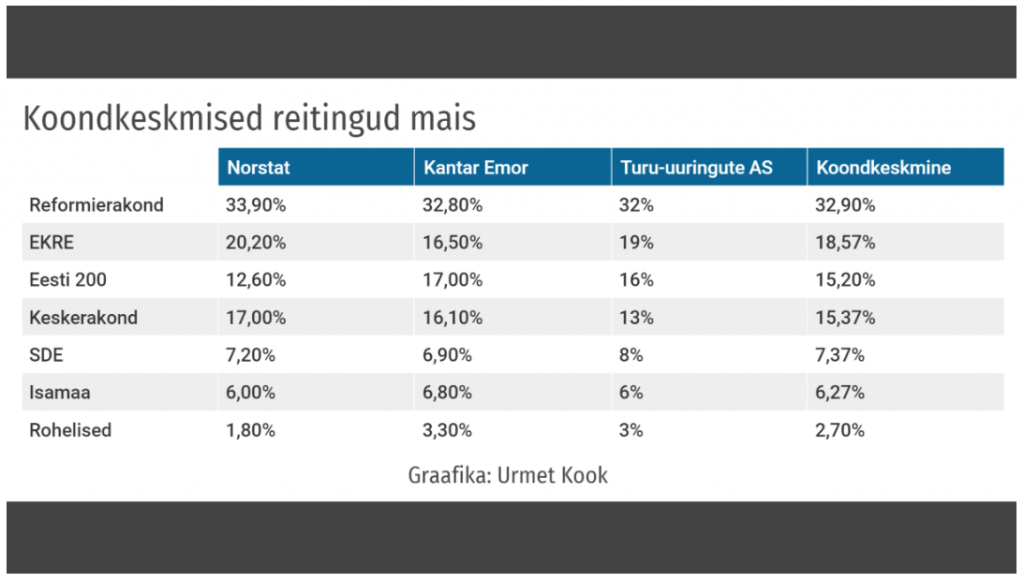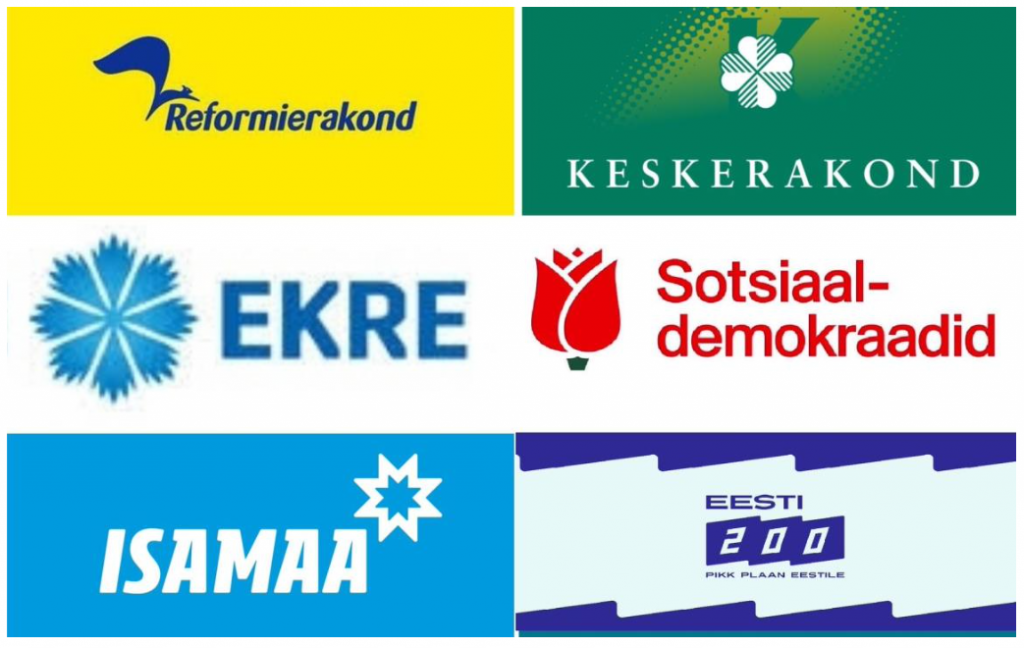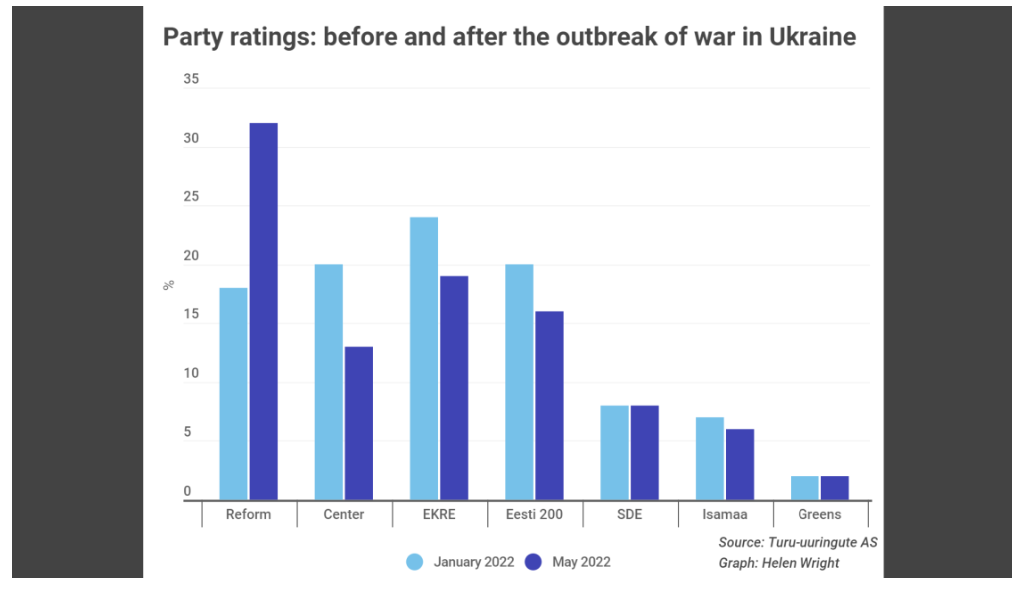Weekly Briefing, Vol. 50. No. 1 (EE) April 2022
Getting ready for the next year’s parliamentary elections…
Whatever the external situation is, one should not forget about the political daily routine at home. Are the new parliamentary elections fast approaching, being scheduled for the next year? No worries, it is time to think about the chances and, possibly, a new coalitional partner as well. In Estonia, the strength of the governmental coalition, which was established under the umbrella of the first ever cabinet of Kaja Kallas on 26 January 2021, was indirectly challenged by the Russo-Ukrainian War. Why? Because, as discussed in the previous briefing for March 2022, in yet another version of a grand coalition of Estonia’s two main political parties (the ‘reformists’ and the Centre Party) the latter started looking very secondary due to its historical semi-political and semi-populistic ‘attachment’ to the so-called ‘Russian theme’.
From 24 February 2022, there were several questions for the ‘centrists’ to get answered, but, as it could be argued, the process of answering would need to be interlinked with the absolute necessity for the party to become less engaged with populism and more involved into rectifying its stance on Russia for the benefit of Estonia and its security. Operationally, therefore, the current Prime Minister’s Reform Party is destined to be increasingly uncomfortable to keep ‘sitting’ in the same governmental coalition with the ‘centrists’ until the next parliamentary elections – there is a danger that the struggling Centre Party will eventually ‘topple’ the ‘reformists’ politically and for the benefit of the other parties. Therefore, as suggested, the Reform Party, while positioning itself as “the best at protecting Estonia from the Kremlin’s threats”, appears to be heading for “another period of domination in Estonian politics to span years if not a full decade”[1].
On the one side, any big intra-political manoeuvring cannot be effectively accomplished without solidifying the party’s institutions. In the very beginning of May, it was reported that the ‘reformists’ appointed Timo Suslov, who made a credible career with the police and a local city government, as the party’s new Secretary General.[2] On the other side, Kaja Kallas herself has become a major factor of the Reform Party’s relative stability in terms of the number of prospective voters. The Estonian society is very curious, innovative, and internationally-oriented. Estonia reads plenty of international media sources, and, since the beginning of the very hot ‘chapter’ of the Russo-Ukrainian War, Kaja Kallas “referred to over 11,000 times in international media online”[3]. It was reported that the Estonian Prime Minister, for “a huge benefit to Estonia”, managed to appear on the spots with the BBC, CNN, The Times, Le Monde, Bloomberg, Deutsche Welle, The Washington Post, and others. In plain digits, considering the fact that the vast majority of those media sources are ‘cultivating’ the English-language political discourse, “[Kaja] Kallas was cited 6,300 times by the U.S. media and 2,110 times in the U.K., [being] […] also referenced 3,050 times by the German media, though the figure for the French media (100) was significantly lower”[4]. Given the context, an expert’s opinion on the topic had underscored the obvious – “[t]his image of a smart politician also gets passed on to the public”[5].
As a result, in May, the ‘reformists’ kept enjoying the heights of 30 odd per cent of popular support, hitting 33 per cent in a poll, conducted by the NGO Institute for Societal Studies and Norstat[6]. These days, not many experts are surprised that the oppositional Conservative People’s Party (EKRE) easily overtakes the Centre Party in polls (with correspondingly 21.4 per cent against 17.8 per cent)[7]. Even though the Reform–Centre coalition is still performing on the positive side of the electoral support (above 50 per cent), it is hanging on only just and only because of the popularity of the Prime Minister’s political organisation. The end of the same month proved the durability of the upcoming trend – as reported, the Centre Party “saw its rating remain relatively static, while the […] [s]upport for Reform ranged between 32 and 34 per cent of those polled by the three different companies”[8]. Interestingly enough, in one of the major polls, the combined results of the oppositional Pro Patria and the ‘social democrats’ overtook the figure for the ‘centrists’, showing that the previously mighty political party (currently led by the Speaker of the Riigikogu and the former Prime Minister Jüri Ratas) is gradually losing its prospective electoral value (see Table 1 for more info).
Table 1: Overall average ratings of the major Estonian political parties in May 2022

Source: ERR
Picture 1: Party logos of the six largest political parties in Estonia

Source: ERR
When it comes from a socio-ethnic dimension of the country’s political life, it is known that, currently, less than 10 per cent of ethnic Estonians show their support of the ‘centrists’, while the party still finds its electoral base among non-ethnic Estonians (a bit more than 40 per cent of them are in favour of the ‘centrists’[9], but, arguably, it is exactly where they are losing big time now. Only a more in-depth as well as a nuanced future analysis can help in outlining where those prospective voters are ‘heading to’ in the distinctly electoral sense of this expression. Speculatively speaking, even for a handful of the ‘centrists’, who may be quietly supporting or finding justifications for the Russian aggression against Ukraine, it will be politically suicidal to make such thoughts public. However, openly condemning Russia may go against the ‘political grain’ with some of the segments of the electorate who have always been in favour of the Kremlin and whatever actions it may go for implementing. Apart from the purely intra-political angle, such a situation has plenty to do with a range emerging security challenges for Estonia, but it is a completely different discussion altogether. What is very important to underline at this point is that the Russo-Ukrainian War has irreversibly become an impact-making factor for internal politics in Estonia – Table 2 is clearly showing the ‘before’ and ‘after’ digits in regards of the major parties’ ratings.
Table 2

Source: ERR
In details, having looked at the figures from January (‘before’) until May (nearly three months ‘after’) within one of the main pollsters’ datasets, the ‘reformists’ have gradually become the most popular party by far (literally, the nearly doubled their popularity-associated results, from 18 to 32 per cent), while the EKRE have gone down substantially (decreasing its popularity by 5 per cent)[10]. A serious contender for entering the Riigikogu in 2023, the Eesti 200, are currently struggling a bit (it is confirmed by the loss of 4 per cent), but it is going to be too extravagant if they manage to lose their current 16 per cent of the prospective votes in less than a year. The main results, however, belong to the Centre Party, which have fallen by 7 per cent, losing its second place in the ranks of the most popular and getting into uncertainty[11].
Considering the above, it was only a matter of time when ‘love story’ within the coalition would get unfolded to see the real situation between the two partners-in-Government. By the end of May, feeling the pain of losing the prospective political ground for 2023, the Centre Party decided to harness the ‘race’ by seeking to introduce a family benefits hike through adopting a law, but the initiative not only dramatically went against the desire of the Prime Minister’s Reform Party – it did not gain any additional popular support either[12]. Commenting on the proposal of the ‘centrists’ in regards of their draft legislation to amend the Family Benefits Act, Prime Minister Kallas noted the following: “My proposal was to try and find a solution inside the coalition. If our coalition partner expresses no such wish, it appears they have no desire to maintain this coalition”[13]. Immediately, it became objectively obvious that the days of the current governmental coalition are counted.
[1] Tõnis Saarts, ‘In anticipation of Reform Party hegemony’ in ERR, 2 May 2022. Available from [https://news.err.ee/1608583879/tonis-saarts-in-anticipation-of-reform-party-hegemony].
[2] ‘Reform appoints new party secretary general’ in ERR, 4 May 2022. Available from [https://news.err.ee/1608586078/reform-appoints-new-party-secretary-general].
[3] ‘Experts: Kallas’ high international media exposure benefits Estonia hugely’ in ERR, 7 May 2022. Available from [https://news.err.ee/1608589981/experts-kallas-high-international-media-exposure-benefits-estonia-hugely].
[4] ‘Experts: Kallas’ high international media exposure benefits Estonia hugely’.
[5] Maarju Himma-Kadakas as cited in ‘Experts: Kallas’ high international media exposure benefits Estonia hugely’.
[6] ‘Norstat ratings: Reform gains in support’ in ERR, 11 May 2022. Available from [https://news.err.ee/1608593431/norstat-ratings-reform-gains-in-support].
[7] ‘Norstat ratings: Reform gains in support’.
[8] ‘Combined ratings: Reform only party to see support rise in May’ in ERR, 31 May 2022. Available from [https://news.err.ee/1608614746/combined-ratings-reform-only-party-to-see-support-rise-in-may].
[9] ‘Emor ratings: Reform in the lead, Center losing ground’ in ERR, 24 April 2022. Available from [https://news.err.ee/1608571180/emor-ratings-reform-in-the-lead-center-losing-ground].
[10] ‘Ratings: Support for Reform Party still rising’ in ERR, 19 May 2022. Available from [https://news.err.ee/1608601726/ratings-support-for-reform-party-still-rising].
[11] ‘Ratings: Support for Reform Party still rising’.
[12] ‘Kantar Emor ratings: Government row did not add to Center popularity’ in ERR, 26 May 2022. Available from [https://news.err.ee/1608609217/kantar-emor-ratings-government-row-did-not-add-to-center-popularity].
[13] Kaja Kallas as cited in ‘Reform Party could resort to filibustering family benefits bill’, ERR, 26 May 2022. Available from [https://news.err.ee/1608610216/reform-party-could-resort-to-filibustering-family-benefits-bill].
